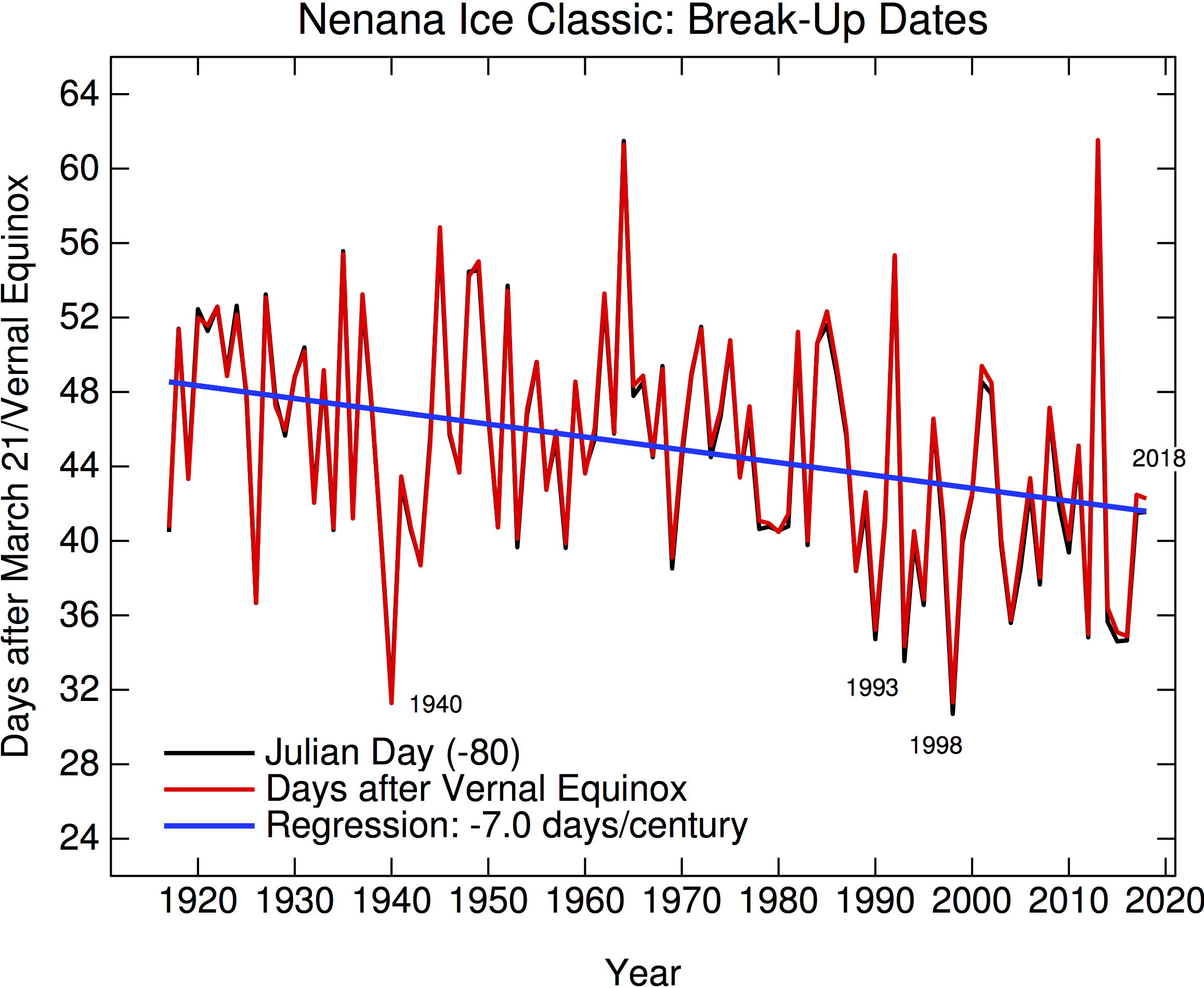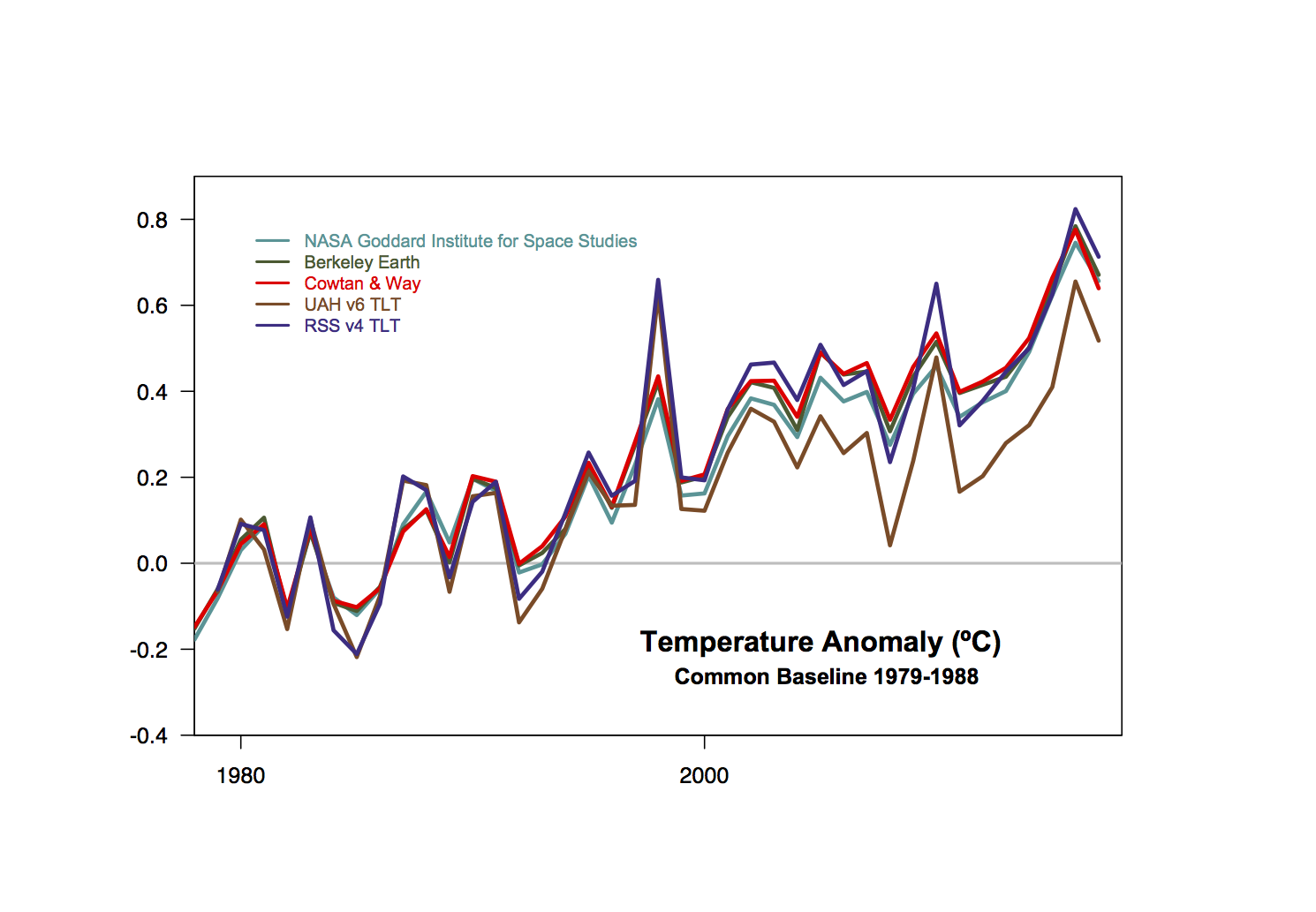A few weeks ago, we’ve argued in a paper in Nature that the Atlantic overturning circulation (sometimes popularly dubbed the Gulf Stream System) has weakened significantly since the late 19th Century, with most of the decline happening since the mid-20th Century. We have since received much praise for our study from colleagues around the world (thanks for that). But there were also some questions and criticisms in the media, so I’d like to present a forum here for discussing these questions and hope that others (particularly those with a different view) will weigh in in the comments section below. [Read more…] about If you doubt that the AMOC has weakened, read this
Instrumental Record
Transparency in climate science
Good thing? Of course.*
Nenana Ice Classic 2018
Another year, another ice out date. As in previous years, here’s an update of the Nenana Ice Classic time series (raw date, and then with a small adjustment for the calendrical variations in ‘spring’). One time series doesn’t prove much, but this is of course part of a much larger archive of phenomenological climate-related data that I’ve talked about before.
This year the ice on the Tanana River went out on May 1st, oddly enough the same date as last year, after another very warm (but quite snowy) Alaskan winter.

My shadow bet on whether any climate contrarian site will mention this dataset remains in play (none have since 2013 which was an record late year). [Update: It was mentioned on WUWT!]
The Alsup Aftermath
The presentations from the Climate Science tutorial last month have all been posted (links below), and Myles Allen (the first presenter for the plaintiffs) gives his impression of the events.
[Read more…] about The Alsup Aftermath
Stronger evidence for a weaker Atlantic overturning circulation
Through two new studies in Nature, the weakening of the Gulf Stream System is back in the scientific headlines. But even before that, interesting new papers have been published – high time for an update on this topic.
Let’s start with tomorrow’s issue of Nature, which besides the two new studies (one of which I was involved in) also includes a News&Views commentary. Everything revolves around the question of whether the Gulf Stream System has already weakened. Climate models predict this will be one consequence of global warming – alongside other problems such as rising sea levels and increasing heat waves, droughts and extreme precipitation. But is such a slowdown already underway today? This question is easier asked than answered. The Atlantic Meridional Overturning Circulation (AMOC, also known as Gulf Stream System) is a huge, three-dimensional flow system throughout the Atlantic, which fluctuates on different time scales. It is therefore by no means enough to put a current meter in the water at one or two points. [Read more…] about Stronger evidence for a weaker Atlantic overturning circulation
Alsup asks for answers
Some of you might have read about the lawsuit by a number of municipalities (including San Francisco and Oakland) against the major oil companies for damages (related primarily to sea level rise) caused by anthropogenic climate change. The legal details on standing, jurisdiction, etc. are all very interesting (follow @ColumbiaClimate for those details), but somewhat uniquely, the judge (William Alsup) has asked for a tutorial on climate science (2 hours of evidence from the plaintiffs and the defendents). Furthermore, he has posted a list of eight questions that he’d like the teams to answer.
More ice-out and skating day data sets
The responses to the last post on the Rideau Canal Skateway season changes were interesting, and led to a few pointers to additional data sets that show similar trends and some rather odd counter-points from the usual suspects.
[Read more…] about More ice-out and skating day data sets
2017 temperature summary
This is a thread to discuss the surface temperature records that were all released yesterday (Jan 18). There is far too much data-vizualization on this to link to, but feel free to do so in the comments. Bottom line? It’s still getting warmer.

[Update: the page of model/observational data comparisons has now been updated too.]
O Say can you See Ice…
Some concerns about continued monitoring of sea ice by remote sensing were raised this week in Nature News an article in the (UK) Observer: Donald Trump accused of obstructing satellite research into climate change. The last headline is not really correct, but the underlying issues are real.
1.5ºC: Geophysically impossible or not?
Guest commentary by Ben Sanderson
Millar et al’s recent paper in Nature Geoscience has provoked a lot of lively discussion, with the authors of the original paper releasing a statement to clarify that their paper did not suggest that “action to reduce greenhouse gas emissions is no longer urgent“, rather that 1.5ºC (above the pre-industrial) is not “geophysically impossible”.
The range of post-2014 allowable emissions for a 66% chance of not passing 1.5ºC in Millar et al of 200-240GtC implies that the planet would exceed the threshold after 2030 at current emissions levels, compared with the AR5 analysis which would imply most likely exceedance before 2020. Assuming the Millar numbers are correct changes 1.5ºC from fantasy to merely very difficult.
But is this statement overconfident? Last week’s post on Realclimate raised a couple of issues which imply that both the choice of observational dataset and the chosen pre-industrial baseline period can influence the conclusion of how much warming the Earth has experienced to date. Here, I consider three aspects of the analysis – and assess how they influence the conclusions of the study.
[Read more…] about 1.5ºC: Geophysically impossible or not?